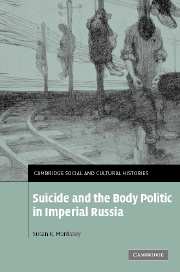Book contents
- Frontmatter
- Contents
- List of illustrations
- List of figures
- List of tables
- Acknowledgments
- Note on transliteration, translations, and dates
- List of abbreviations
- Introduction
- Part I Public order and its malcontents
- Part II Disease of the century
- 7 Sciences of suicide
- 8 Crime, disease, sin: disputed judgments
- 9 A ray of light in the kingdom of darkness
- Part III Political theology and moral epidemics
- Epilogue
- Selected bibliography
- Index
9 - A ray of light in the kingdom of darkness
Published online by Cambridge University Press: 18 July 2009
- Frontmatter
- Contents
- List of illustrations
- List of figures
- List of tables
- Acknowledgments
- Note on transliteration, translations, and dates
- List of abbreviations
- Introduction
- Part I Public order and its malcontents
- Part II Disease of the century
- 7 Sciences of suicide
- 8 Crime, disease, sin: disputed judgments
- 9 A ray of light in the kingdom of darkness
- Part III Political theology and moral epidemics
- Epilogue
- Selected bibliography
- Index
Summary
Where should I go now? Home? No, to go home is the same as going to the grave. Yes, to home, or to the grave … It is better in the grave … A little grave under a tree … How fine! The sun warms it, the rain washes it. In the spring the grass will grow over it, soft grass … The birds will fly to the tree, they will sing, raise their young. The flowers will blossom: yellow ones, red, blue … all kinds … all kinds. How quiet, how nice everything will be. I feel somehow better! I don't even want to think anymore about life. To live again? No, no, I don't want to. It's not worth it.
Aleksandr Ostrovskii, The Storm, 1859To live in the kingdom of darkness is worse than death.
Nikolai Dobroliubov, “A Ray of Light in the Kingdom of Darkness,” 1860In 1859, the radical literary critic Nikolai Dobroliubov published one of his most influential articles entitled “The Kingdom of Darkness.” Applying the principles of real criticism, Dobroliubov interpreted the dramatic corpus of the well-known playwright, Aleksandr Ostrovskii, as an expression of real Russian life. This was a world of petty tyranny (samodurstvo), particularly in the family, and its primary consequence was the deformation of the human personality. Not only did it produce “an external submissiveness and a dulled, concentrated grief;” it also encouraged “a slave-like cunning, the most vile deception, and treachery without conscience.”
- Type
- Chapter
- Information
- Suicide and the Body Politic in Imperial Russia , pp. 238 - 270Publisher: Cambridge University PressPrint publication year: 2007



